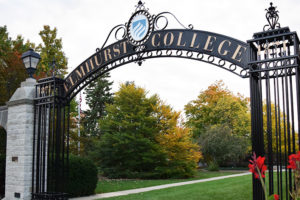
You can find them in the inner city, among the prostitutes, the homeless and the downtrodden, working to reclaim the heart of their cities as a place for worship and hope.
They ruffle feathers, go against the current, and ask the questions no one wants asked.
Four notable activist church leaders spoke passionately of the pitfalls and promise of their radical approaches to ministering in cities during the Sacred Conversations on Urban Ministry event at Elmhurst College on Thursday, March 21.
The event was moderated by the Rev. Ronald Harris, executive director of Paulsjourney, a community development initiative in Chicago. The panelists included the Rev. Corey B. Brooks Sr., pastor of the New Beginnings Church in Chicago; Shane Claiborne, founder of The Simple Way ministry movement in Philadelphia; Father Michael Pfleger, pastor of the St. Sabina parish in Chicago; and the Rev. Dr. Shanta Premawardhana, president of the Seminary Consortium for Urban Pastoral Education in Chicago.
“We do ministry in some tough areas where people have lost their hope, but we believe that with the hope of Christ, things can change,” Brooks said. He made national headlines last year for taking back a blighted motel by living on its roof for 94 days to raise enough money to have the building torn down and replaced with a community center. “The church must be radical to change things around. If you’re not radical, you can’t effectively reach the people you need to reach.”
Despite having opportunities to minister in safer, more comfortable surroundings, the activists spoke of being “nudged” by God to work in inner-city neighborhoods, where they have stood their ground against drug dealers and suffered with the lowly because that’s what Jesus did.
Looking beyond the tragic but familiar narrative of low-income, gang-infested neighborhoods, the panelists said they see a brighter future as long as urban churches step up to become centers of hope that share the Gospel through bold actions.
“Jesus calls us near to the suffering, near to the people who have been trampled on,” said Claiborne, a Christian author and activist for nonviolence and service to the poor. “Jesus didn’t just come to help the poor. He came as the poor.”
When asked about their most critical contemporary challenges, they spoke about government’s disinvestment in poor neighborhoods, the fragmentation of “those who have from those who have nothing” and staggering roadblocks such as economic policies that hinder the poor instead of helping them.
Claiborne recalled a poor woman in Philadelphia, where he ministers, who lost temporary custody of her children after a kitchen fire because the home was deemed unsafe. Then she was denied a grant to fix her home because the state said the money was earmarked for families with children.
“Concentrated poverty didn’t just happen. It happens because of economic policies made by the state,” Premawardhana said. “It is not because people are lazy or poor.”
The panel discussion, sponsored by the College’s Niebuhr Center for Faith and Action, is the fourth installment of the Sacred Conversations series. The series began after the United Church of Christ developed Sacred Conversations on Race as a response to the controversy, during the 2008 presidential campaign, involving then-Sen. Barack Obama and his association with Pastor Jeremiah A. Wright of Trinity United Church of Christ. Elmhurst College is affiliated with the UCC.
During the panel discussion, Harris asked the activists how they realized that they didn’t need a “badge of honor” to enter into the chaos of the inner city to do ministry work.
“I sense this angst in you that won’t burn out, and theological education didn’t give you that,” he said.
Father Michael Pfleger, pastor of St. Sabina parish in Chicago, recalled the day he met an African American woman who had worked with Dr. Martin Luther King Jr. during the Montgomery Bus Boycott. She cared for a white family, even though the man called her the “N” word every day and would make her work late. She’d walk miles home, enduring taunts and threats, all because of the boycott.
Once at home, she’d sit all night with her feet in a bowl of cold water to reduce the swelling, so she could walk back to work the next day. Pfleger had asked her what kept her going for more than a year.
“She told me, ‘My faith in God, and because it was just right,’” Pfleger recalled. “It struck me: If we’re going to be faithful to Him, we’re going to have wounds.”
Reminding the audience of the wounds on Jesus’s hands and feet, Harris asked audience members to hold up their right hands and repeat after him.
“I will forever ponder, ‘Where are my wounds?’”
The Sacred Conversations on Urban Ministry event came together after several students had visited the Niebuhr Center for Faith and Action to learn more about working in America’s inner cities, said the Rev. Dr. Ronald K. Beauchamp, director of the Niebuhr Center. Last year, students traveled to Washington, D.C., Cleveland, Philadelphia and Chicago to work as interns and to gain field experience.
In addition, Beauchamp said, “we decided to bring to campus some of the best scholarly, practical and radical leaders in the field, and allow them to have an open conversation.”
“Our goal was to create an experiential, educational moment where students could learn about the passion that drives these leaders, about professional and educational preparedness, the sacrifice that impacts their daily life, and the joy from their success stories,” he said.
“The event exceeded our highest expectations and created a buzz among the students and guests for more time to dialogue.”